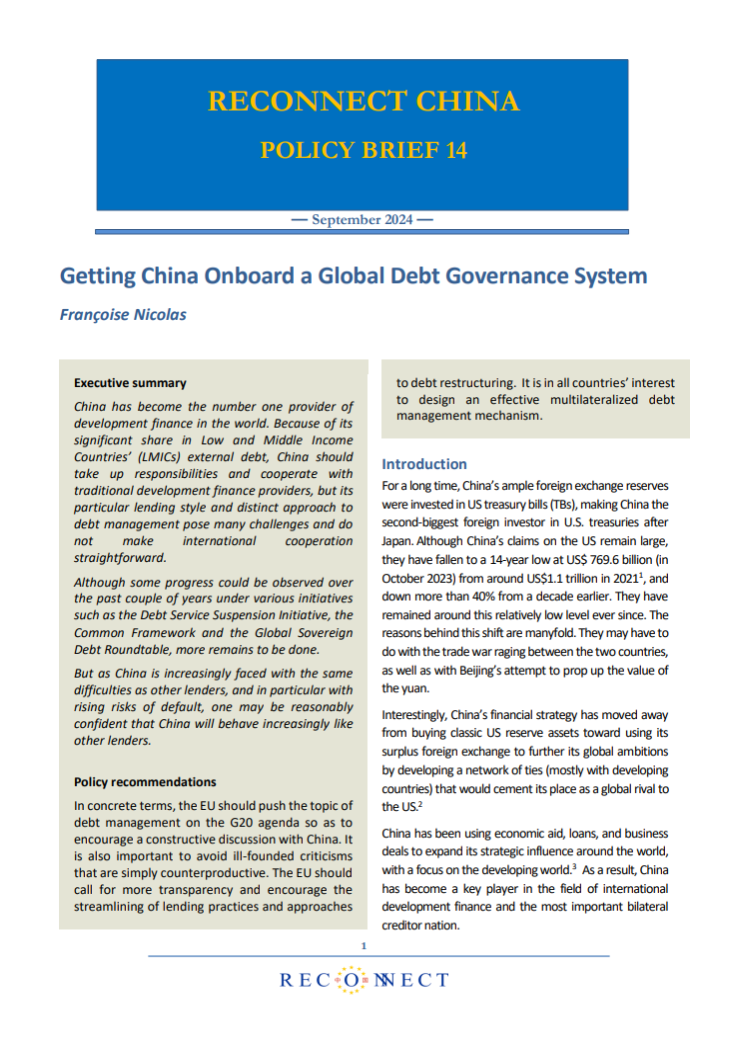Getting China Onboard a Global Debt Governance System

China has become the number one provider of development finance in the world. Because of its significant share in Low and Middle Income Countries’ (LMICs) external debt, China should take up responsibilities and cooperate with traditional development finance providers, but its particular lending style and distinct approach to debt management pose many challenges and do not make international cooperation straightforward.
Although some progress could be observed over the past couple of years under various initiatives such as the Debt Service Suspension Initiative, the Common Framework and the Global Sovereign Debt Roundtable, more remains to be done. But as China is increasingly faced with the same difficulties as other lenders, and in particular with rising risks of default, one may be reasonably confident that China will behave increasingly like other lenders.
In concrete terms, the EU should push the topic of debt management on the G20 agenda so as to encourage a constructive discussion with China. It is also important to avoid ill-founded criticisms that are simply counterproductive. The EU should call for more transparency and encourage the streamlining of lending practices and approaches to debt restructuring. It is in all countries’ interest to design an effective multilateralized debt management mechanism.
ReConnect China is a research project dedicated to strengthening independent knowledge on China in Europe. Funded as part of the European Commission’s Horizon Europe program, the four-year project brings together 15 institutions and 66 researchers across 12 European countries. Ifri will contribute policy briefs such as this one throughout the lifespan of the project, ranging from science and technology to China’s economy to foreign policy and China’s place in international affairs.

Available in:
Themes and regions
Share
Download the full analysis
This page contains only a summary of our work. If you would like to have access to all the information from our research on the subject, you can download the full version in PDF format.
Getting China Onboard a Global Debt Governance System
Related centers and programs
Discover our other research centers and programsFind out more
Discover all our analyses
China’s Strategy Toward Pacific Island countries: Countering Taiwan and Western Influence
Over the past decade, China has deployed a diplomatic strategy toward the Pacific Island Countries (PICs). This strategy pursues two main objectives: countering Taiwan's diplomatic influence in the region and countering the influence of liberal democracies in what Beijing refers to as the "Global South."

Opening up the G7 to South Korea to Address Contemporary Global Challenges
The G7’s global influence has diminished as powers like China reshape international governance through initiatives such as BRICS and the Shanghai Cooperation Organisation (SCO). With the G7 now representing just 10 per cent of the world’s population and 28 per cent of global GDP, its relevance is increasingly questioned.
Expanding SPDMM as a pivotal institution in the Pacific – A French perspective
The South Pacific Defence Ministers’ Meeting (SPDMM) is the only forum that brings together defense ministers from the wider South Pacific — including Chile, which is hosting it for the first time. This heterogeneous group of countries with varying resources, capacities, and interests — Australia, Chile, Fiji, France, New Zealand, Papua New Guinea (PNG), and Tonga — are united by their shared determination to strengthen cooperation on maritime security and humanitarian assistance and disaster relief (HADR) activities.
EU’s Derisking From China: A Daunting Task
With economic security as a major concern, the EU has recently turned to “derisking” from China. The EU strategy entails reducing critical dependencies and vulnerabilities, including in EU supply chains, and diversifying where necessary, while recognizing the importance and need to maintain open channels of communication.











